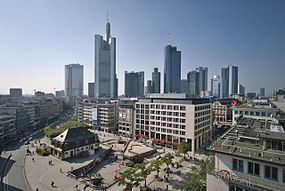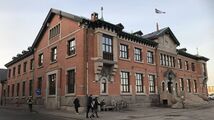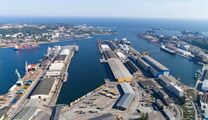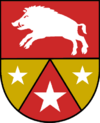Economy of Littland
 From top to bottom, left to right: Kaslund Financial District, Central Bank of Littland, Port of Aalhavn | |
| Currency | Littish daler (DAL) |
|---|---|
| Calendar year | |
Trade organisations | AECO Developed/Advanced High-income economy |
| Statistics | |
| Population | |
| GDP | |
GDP growth | 1.6% (2020) |
GDP per capita | |
GDP by sector |
|
| 1.8% (2021) | |
Population below poverty line | |
| Unemployment |
|
Main industries | |
| External | |
| Exports | |
Export goods |
|
Main export partners | |
| Imports | |
Import goods |
|
Main import partners | |
| Public finances | |
| |
| Foster & Ajax: AA (Domestic) A (Foreign) | |
Foreign reserves | $60.3 billion (2020) |
All values, unless otherwise stated, are in US dollars. | |
The economy of Littland is a developed high income social market economy.
History
Historically Littland was an agrarian society for a majority of it's history, even through the industrial revolution with only minor industry appearing in major cities. Littland underwent rapid industrialization following the end of the Littish Civil War in 1913. Part of reconstruction was the investment into heavy industries such as mining, steel and machinery production among others. The agricultural sector was also modernized and fertilizer, tractors and other equipment was imported during the next couple decades.
After the First Argic War the importance of heavy industry declined. Agricultural output had also declined since the end of the 1940's as more and more people were moving into the cities. As the industrial and agricultural sectors declined a thriving service sector had appeared which started expanding rapidly to satisfy the demands of the new urban population, companies such as Guldbrand, Summarum, Rislev, Telemax and Nordsoft were founded during this era of economic growth. Nowadays, building on long-standing traditions and a highly skilled labor force, main industries of Littland include: Iron and Steel production, Electronics and Machinery, Food Processing and Pharmaceuticals.
Following the 1991 Economic Crash, Littland economy became more of less completely stagnant, with GDP growth from 1991 to 2006 being only 1.4%. Government austerity measures did not help the already strained economy and in 2005 unemployment figures were up to 16.2%, a record high. After the 2008 election the Christian Democratic League won a great victory thanks to their "New Littish Business" (Nyt Littisk Erhverv) economic program, often called "NLE" for short. The NLE included a reform to the labor market, taxes, business permits, state pensions and several new trade initiatives with other countries. While reaction were mixed on its implementation and controversies arose on the state pension reform, it is generally viewed as a success and by 2015 the Littish economy were once again growing, although still slower than before the economic crisis.
Currency
The Littish currency is the Littish daler, which is valued at 4.71 DAL to 1 USD. The currency is sometimes referred to as the Littish dollar in some countries. Inflation has been fluctuating the past few decades, reaching its peak in 2003. The central bank, Littlands Nationalbank, has since then begun to relax certain rules on currency controls although the currency is not widely used internationally. Government intervention has also helped curb the inflation, which now sits at 1.8%. The currency inflation is at 3.06% as of 2021.
Industry
Infrastructure
Transport
Littland has 52,135 km of roads and highways, the railway system is 7,685 km long and 5,488 km of it is electrified. Littland has direct road and railway connections to Walneria, Estimeria and Malskia. Along with its extensive land infrastructure, Littland has 4 major international airports, the largest being Kaslund International Airport, and 2 deep-water seaports, the largest being the Port of Aalhavn. The Port of Aalhavn had over 4,000,000 passengers pass through in 2019.
Utilities
Electricity and running water is widely available in Littland, with every household having access to basic utilities. Piped gas is available to 86.7% of households. It is the responsibility of the municipalities to provide these services to the people. Additionally, the government offers subsidies to companies who wish to develop, water and sewage systems. Internet access was a problem in the early 2010's with only 46.8% of households having internet access (with 34% being broadband) in 2011, but recent developments has seen internet access soar to 94.7% (with 87% being broadband) in 2021.
External trade
| Country | Agreement | Abbr. | Effective |
|---|---|---|---|
| Littland-Walnerian Economic Cooperation Agreement | LWECA | 1 January 2006 | |
| Littland-Thransaltz Economic Cooperation Agreement | LTECA | 1 November 2010 | |
| Estimeria-Littland Free Trade Agreement | ELFTA | 1 March 2011 | |
| Littland-Malskia Economic Prosperity Agreement | LMEPA | 1 September 2017 | |
| Littland-Walnerian Deeper Economic Cooperation Agreement | LWDECA | 1 January 2019 | |
| Littland-Thransaltz Deeper Economic Cooperation Agreement | LTDECA | 1 August 2019 | |
Major companies
Largest companies
| Image | Name | Industry Sector | Revenue (in Đ) |
Headquarters | Founded |
|---|---|---|---|---|---|

|
Fergo Industries | Industrial Conglomerate | 133.29 billion | Klinstrup | 1927 |

|
Rislev Foods | Food & Beverages | 116.73 billion | Kaslund | 1952 |

|
Guldbrand Group | Retailing | 108.37 billion | Kaslund | 1971 |

|
Parsol | Pharmaceuticals | 85.64 billion | Kaslund | 1948 |
Notable companies
| Name | Industry Sector | Headquarters | Founded |
|---|---|---|---|
| Summarum | Household Durables | Klinstrup | 1964 |
| NordSoft | Software & Services | Rødskov | 1979 |
| Bravo Broadcasting | Media & Entertainment | Aalhavn | 1993 |
| OPA Media | Media | Kaslund | 1982 |
| Holst Premium | Packaged Foods & Meats | Frankerup | 1948 |
| Torcon | Construction & Engineering | Klinstrup | 1946 |
| TeleMax | Telecommunication Services | Gistrup | 1978 |
| Noxu Game Studios | Software | Halling | 1992 |


